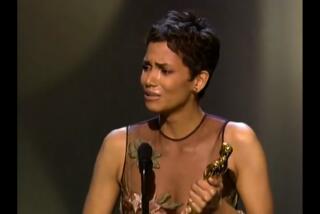Clink! Clink! Here’s to All Those Toasts That Don’t Clunk
- Share via
The tension is building. You think you’re ready, but are you? What if you start off the new year by making a big fat fool of yourself? It could happen.
That’s right, you might blow your New Year’s Eve toast. And you know the rule on toasts: no do-overs.
Apparently sensing the potential danger, Orange County-based Toastmasters International wants to help.
The group, founded in the Santa Ana YMCA’s basement in 1924 and now claiming a worldwide membership of 180,000 (5,000 locally), has some ideas on how to make your toast both moving and memorable.
“The most important thing is to speak from the heart,” Toastmasters President Alfred Herzing says. “As long as you are, and you’re not being cute, even if you do misstate something, nobody’s going to beat you up about it.”
I spoke by cell phone to Herzing, who lives in Yorba Linda, while he was on a ski lift at Snow Summit. He’ll toast his family on New Year’s Eve, he says, and keep it simple. “I’m just going to talk about how appreciative I am of all we have.”
Oh, had he and I met a long time ago. He could have saved me a lot of trouble.
I’ve probably given a dozen or so toasts in my time, most of them far short of the mark. One came at my younger brother’s high school graduation dinner party and was so poorly rendered that the thought of it haunts me still.
After acknowledging his achievement, I urged him to “enjoy this time in your life.” That would have been fine, but some evil spirit in my head then forced me to say, “Before you realize what a rotten place the world really is.”
Talk about your mood-killer. That I remember the exact phrase 24 years later shows how it has tormented me.
I don’t know why I said it. I choked under the pressure and, instead of being sardonic, was a dope. Some consolation is that at my brother’s wedding eight years later, I did much better.
“The biggest mistake I’ve seen people make,” Herzing says, “is trying to be cute or funny and do it at someone else’s expense. That can backfire and not be well-
received.”
Toasts should be uplifting. “The toast doesn’t have to be funny,” Herzing says. “It can be touching or moving. It should be positive.”
I was thinking positive in the early 1970s when I performed my first best-man duty. Lovely ceremony, lovely reception. We still talk of my toast to the bride and groom, both of whom I knew well.
I clinked the glass and began. I forget the beginning and middle, but the ending was memorable. “And, so, please join me in wishing a lifetime of happiness for Rog and Barb.”
About the same time it hit the guests (a one-second delayed reaction), it hit me that the bride’s name was Carol.
My excuse that I had a very close cousin named Roger, who had married a woman named Barb a couple years earlier, did little to recoup lost ground. Take heart in knowing Rog and Carol are still married nearly 30 years later.
Herzing concedes that public speaking can be tough and that it would be in extremely bad form for a host to ask a guest to deliver an impromptu toast. Just in case, though, Toastmasters teaches members how to speak off the cuff.
If there’s an art to toasting, Herzing says, it’s to keep it real and keep it simple. He suggests a two-minute limit.
“That’s why you’ve got to stand when you give a toast,” Herzing says. “If you get tired of standing, it’s probably time to end the toast.”
He also suggests practicing your remarks in front of a mirror or another person. At toast time, look directly into the eyes of the person you’re toasting.
One other tip: Stay sober. The drinking comes after the toast, Herzing says.
With all that in mind and the pressure becoming too intense, let me toast you, faithful readers. And even you unfaithful readers (stop it--too cutesy).
You make the job worthwhile, and I thank you for your patronage and the kindness of your remarks. Best wishes for a wonderful 2002. Please, and I can’t stress this enough:
The world really is not a rotten place.
*
Dana Parsons’ column appears Wednesdays, Fridays and Sundays. Readers may reach Parsons by calling (714) 966-7821 or by writing to him at The Times’ Orange County edition, 1375 Sunflower Ave., Costa Mesa, CA 92626, or by e-mail to dana.parsons@latimes.com.
More to Read
Eat your way across L.A.
Get our weekly Tasting Notes newsletter for reviews, news and more.
You may occasionally receive promotional content from the Los Angeles Times.








